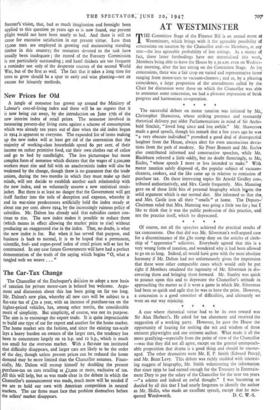The Car-Tax Change
The Chancellor of the. Exchequer's deCision to adopt a new basis of taxation for private motor-cars is belated but welcome. Argu- ment and discussion about this has been going on far too long. 'Mr. Dalton's new plan, whereby all new cars will be subject to a flat-rate tax of £m a year, with an increase of purchase-tax on the higher-priced vehicles, has, among other merits, the considerable merit of simplicity. But simplicity, of course, was not its purpose. The aim is to encourage the export trade. It is quite impracticable to build one type of car for export and another for the home market. The home market sets the fashion, and since the existing tax-scale lays a heavy burden on owners of the larger cars, the tendency has been to concentrate largely on to h.p. and 12 h.p., which is much too Small for the overseas market. With a flat-rate tax instituted that difficulty disappears, and larger cars are likely to be the order of the day, though unless present prices can be reduced the home demand may be more limited than the Chancellor assumes. Finan- cially, Mr. Dalton will recoup himself by doubling the present purchase-tax on cars retailing at £L000 or more, exclusive of tax. 411 this will help, but as was made clear in the debate in which the Chancellor's announcement was made, much more will be needed if we are to hold our own with American competition in neutral markets. The car firms must face that problem themselves before the sellers' market disappears.


































 Previous page
Previous page